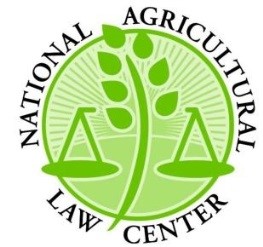Written by: Amie Alexander, JD/MPS Candidate, William H. Bowen School of Law
The Organic Trade Association (OTA) filed a lawsuit in the District Court for the District of Columbia against the United States Department of Agriculture (USDA) on September 13, 2017. OTA alleges that USDA is in violation of The Organic Food Products Act and the Administrative Procedure Act for its delay of the Organic Livestock Rule. You can access the full complaint here.
The Organic Food Products Act and The Organic Livestock Rule
Congress enacted The Organic Food Products Act (OFPA) in 1990 to establish consistent national standards for the marketing of organic products (See 7 U.S.C. § 6501). Congress delegated USDA with the authority to implement detailed standards for organic products. Congress also created a citizen-advisory board called the National Organic Standards Board (NOSB) to collaborate in rulemaking processes by advising the Secretary of Agriculture.
The USDA later implemented the National Organic Program (NOP) in 2000 pursuant to its rulemaking authority from OFPA. At the time, the Secretary announced expectations of continuing collaboration with the NOSB in developing future guidance on animal welfare issues. Soon after the implementation of the NOP, the NOSB began to solicit public comment on animal welfare issues and recommended to USDA that the NOP should issue more detailed standards for both ruminant livestock, which led to a final rule in 2010, and outdoor access for poultry, which is the final rule at issue in this suit.
USDA published its 51-page final rule Organic Livestock and Poultry Practices (“Organic Livestock Rule”) in the Federal Register on January 19, 2017 (see 82 Fed. Reg. at 7042-92). On January 20, 2017, after President Trump was inaugurated, White House Chief of Staff Reince Preibus issued a memorandum encouraging agencies to delay regulations that had not yet taken effect (See 82 Fed. Reg. 8346). The Organic Livestock Rule had been in process for approximately ten years and was scheduled to go into effect on March 18, 2017. However, USDA delayed the effective date of the rule to May 19, 2017. On May 10, 2017, USDA again delayed the Organic Livestock Rule for an additional 180 days.
Also on May 10, USDA published a new proposed rule called “Livestock and Poultry Practices Second Proposed Rule.” This rule sought public comment on how to proceed with the Organic Livestock Rule – specifically seeking comments on whether to let the Organic Livestock Rule go into effect, to suspend the rule indefinitely, to further delay the rule, or to withdraw the rule.
The Organic Livestock Rule is estimated by the Agricultural Marketing Service (AMS) to affect 4,177 currently certified foreign and domestic livestock operations. The Rule is intended to clarify required outdoor access for all “mammalian livestock” and for poultry. Specifically, organic poultry operations must maintain “year-round access to outdoors; shade; shelter; exercise areas; fresh air; direct sunlight; clean water for drinking; materials for dust bathing; adequate outdoor space to escape from predators and aggressive behaviors suitable to the species, its stage of life, and the climate and environment.” (See 81 Fed. Reg. at 22007). The Secretary of Agriculture stressed that The Organic Livestock Rule will serve to maintain consumer trust in the USDA organic seal.
The Organic Trade Association’s Claims
The Organic Trade Association claims that USDA violated OFPA and the Administrative Procedure Act (APA) in its continued delay of the Organic Livestock Rule.
OTA first claims that USDA is in violation of the APA by delaying the Organic Livestock Rule’s effective date without publishing a notice of proposed rulemaking or providing an opportunity for public comment. It also claims UDSA is in violation of the APA for failure to act due to the delay. OTA next claims a violation of the APA by failing to explain its departure from prior conclusions; this claim refers specifically to the Second Proposed Rule’s request for comment as to let the Organic Livestock Rule become effective, suspend the Rule, further delay the Rule, or withdraw the Rule. Finally, OTA alleges USDA violated the OFPA with its failure to implement the Final Organic Livestock Rule.
OTA asked the Court to declare the USDA in violation of the OFPA and the APA and to enjoin USDA from further delay in implementation of the Organic Livestock Rule. You can read the complaint in full here.
